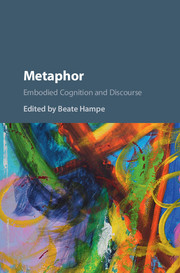Book contents
- MetaphorEmbodied Cognition and Discourse
- Metaphor
- Copyright page
- Contents
- Figures
- Tables
- Contributors
- Editor’s Preface and Acknowledgments
- Introduction
- Part I Metaphor in Cognition
- 2 Sources and Targets in Primary Metaphor Theory: Looking Back and Thinking Ahead
- 3 The Hierarchical Structure of Mental Metaphors
- 4 Metaphorical Directionality: The Role of Language
- 5 Body Schema and Body Image in Metaphorical Cognition
- 6 Primary Metaphors Are Both Cultural and Embodied
- Part II More than Metaphor
- Part III Metaphor in Discourse
- Part IV Salient Metaphor
- Epilogue (A Personal View)
- References
- Person Index
- Subject Index
4 - Metaphorical Directionality: The Role of Language
from Part I - Metaphor in Cognition
Published online by Cambridge University Press: 05 July 2017
- MetaphorEmbodied Cognition and Discourse
- Metaphor
- Copyright page
- Contents
- Figures
- Tables
- Contributors
- Editor’s Preface and Acknowledgments
- Introduction
- Part I Metaphor in Cognition
- 2 Sources and Targets in Primary Metaphor Theory: Looking Back and Thinking Ahead
- 3 The Hierarchical Structure of Mental Metaphors
- 4 Metaphorical Directionality: The Role of Language
- 5 Body Schema and Body Image in Metaphorical Cognition
- 6 Primary Metaphors Are Both Cultural and Embodied
- Part II More than Metaphor
- Part III Metaphor in Discourse
- Part IV Salient Metaphor
- Epilogue (A Personal View)
- References
- Person Index
- Subject Index
Summary
Verbal metaphors are fundamentally directional. For example, people commonly refer to social relations in term of temperature (e.g. “She is a warm person”), but the inverse metaphors in which we talk about temperature in terms of social relations are not usually found. Conceptual Metaphor Theory (Lakoff & Johnson 1980, 1999) attributes this directionality to an underlying unidirectional “conceptual mapping” between the respective domains, rooted in our bodily experience. However, recent psycho-physical experiments have shown these conceptual associations to be bidirectional: Not only can manipulations of an individual’s experience of physical warmth affect that individual’s judgment of another person or situation as friendly or unfriendly, the reverse is also true, as thinking about a friendly or unfriendly social situation can alter an individual’s judgment of room temperature. To account for this discrepancy, we propose that (i) verbal (unidirectional) metaphors rely on a pre-linguistic, non-directional, association between the two domains and that (ii) language plays an essential role in rendering this association into a directional target–source relation.
Information
- Type
- Chapter
- Information
- MetaphorEmbodied Cognition and Discourse, pp. 62 - 81Publisher: Cambridge University PressPrint publication year: 2017
Accessibility standard: Unknown
Why this information is here
This section outlines the accessibility features of this content - including support for screen readers, full keyboard navigation and high-contrast display options. This may not be relevant for you.Accessibility Information
- 8
- Cited by
